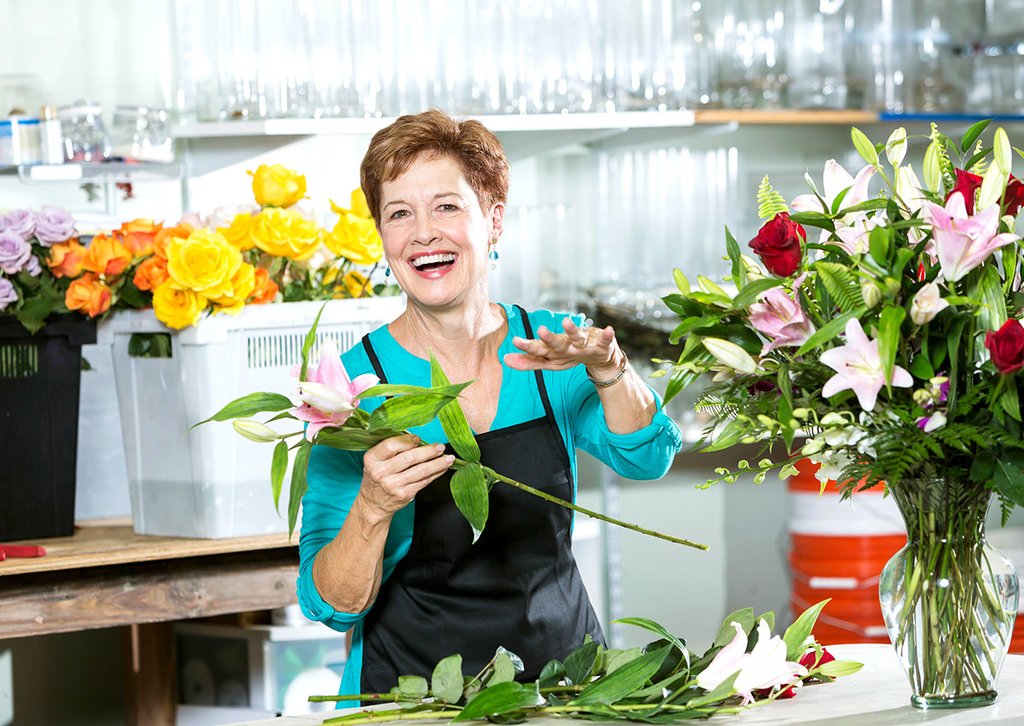If you’re suffering from retirement letdown, know that you’re not alone—and that you can do something about it
By Wendy Haaf
Photo: iStock/KatarzynaBialasiewicz.
Ads often portray retirement as carefree and relaxing, featuring images of healthy, happy couples strolling hand-in-hand on a beach or motoring along in a convertible with the wind in their hair. For some, however, the reality proves quite different.
Apart from income, employment can provide everything from a reason to get out of bed in the morning and a sense of accomplishment to a sense of belonging. If you don’t find a way to replace the rewarding aspects of work when you leave it, retirement can be boring—or even depressing.
However, if you find yourself feeling adrift, dissatisfied, or unhappy with life in retirement, it’s possible to change course and even to turn the coming years into a period of excitement and discovery. Here are three stories of people who have done just that.
Audrey Cooper:
Owner, Art With Panache Gallery
While all four of her children are retired, Audrey Cooper of London, ON, is well into her third career (fourth, if you include stay-at-home mom), and at 90, shows no sign of slowing down any time soon.
Retirement didn’t merely disagree with Cooper; it was one of the main reasons for a depression severe enough to warrant a three-month hospital stay. When Cooper went back to work after a stint as a stay-at-home mother by opening one of the first fully serviced “instant offices” in Toronto, she couldn’t even imagine retiring. “I thought I’d work forever,” she recalls. However, after about 25 years, technology had so cut into her business that she decided it was time to sell, retire, and move to London, where one of her daughters was living. But the transition proved overwhelming. “I had no idea what I was going to do, and I think that was the problem,” she says. “I couldn’t see any hope and I couldn’t see any future.”
Once she was well enough to be released from hospital, Cooper continued to return as an outpatient, and it was during one of her regular visits for occupational therapy that she decided to try turning her hand to painting for the first time.
Having worked as a secretary before marrying, raising four children, and then going into business for herself after a divorce, Cooper had never before considered art as relevant to her life. “Art was for rich people who didn’t have to make a living,” she says.
Casting about for a subject for that first painting, Cooper settled on portraying the life stories of the two rescue cats she’d adopted and brought the result along on one of her regular therapy visits. “I took it in, and the therapist said, ‘Audrey, you should keep doing that. You have a real talent for painting.’”
Cooper did keep at it, creating colourful folk-art-style canvases depicting scenes from her past—from a childhood outing to a neighbourhood theatre to see Snow White during its first run to a suburban scene of a young version of herself surrounded by other young parents and their children. “My paintings are all about growing up in Toronto,” she says.
She had sold a few paintings when she heard about a place where artists could purportedly display their work for free. While the lead turned out to be false, the building did have a small space for rent, which she snapped up. Along the way, Cooper began to meet other artists and felt that she had found her tribe.
“I thought, Where have you people been all my life?” she says. When a larger storefront in the same plaza opened up, Cooper took it over and set about combining the best of both worlds, inviting others to show their work there, too. “You’re alone when you’re creating, and you miss the interaction with other artists,” she says. “Five years later, I don’t paint—I’m a gallery owner. It’s wonderful!”
Janice Perkins
Volunteer, SARI Therapeutic Riding
After taking early retirement from her secretarial career, Janice Perkins—her name has been changed for reasons of privacy—of London, ON, still had plenty to keep her busy, including the latest in a long series of volunteer positions. “I’ve always volunteered with church and school—it’s just part of my life,” she says.
Still, Perkins felt that something was missing—a new challenge, perhaps.
She tried out a few different types of volunteer work, none of which seemed to be the right fit. A lifelong animal lover who had enjoyed doing pet therapy with the second of her two late dogs at a local rehabilitation hospital, Perkins had often thought about following in the footsteps of her daughter, who, as a teen, had volunteered with SARI Therapeutic Riding, an organization that assists children with special needs in learning to ride and care for horses. Never having spent any time around the big animals, however, Perkins was afraid she wouldn’t be able to learn how to handle them. “I kept putting it off because I didn’t think I’d have the ability,” she says. Finally, however, “one day I just did it,” she says with a laugh. “And I love it.”
Not only has Perkins learned new skills and gained confidence around horses, but she’s discovered a passion for working with children with special needs—something she hopes to pursue further.
And while she might have expected that she’d derive a sense of satisfaction from helping others, deep enjoyment from being around animals, and a chance to get outside of herself, Perkins has been pleasantly surprised by some of the relationships that have grown out of her new position.
“There are a lot of young people at SARI, so I was feeling at the start that I was the old lady on the block and didn’t know anything,” she says. However, the volunteer coordinator set her straight, pointing out that part of the organization’s mandate “is for young people to realize that older people can actually do things,” Perkins says. In the 3½ years since, some of her young colleagues have become more like family members. “On Mother’s Day, I got a box of chocolates from one of them and a Facebook message from another,” she says.
Overall, the experience has reinforced Perkins’s sense of curiosity and adventure. “There are just so many things to be interested in,” she says. “I’m all about not saying ‘I can’t.’”
Joyce Wayne
Author, Last Night of the World
After taking early retirement from teaching print journalism at Sheridan College in Oakville, ON, Joyce Wayne had no clear idea of what she was going to do.
“I wanted to get back into writing full-time as a freelancer, but I wasn’t sure how I was going to do that,” she says.
To give herself time to adjust while figuring out how to proceed during that first year, she went back to teach one evening class. One night partway through the term, Wayne says, “I got a tweet from The Globe and Mail saying they were looking for someone to write a column about retirement; they were going to have a little competition.”
She entered and won, going on to write a regular column called “Living in Retirement” for the business section. “That was wonderful, because I got my journalism chops back,” she says. One thing led to another. “Someone offered to sponsor my blog, and I would write more or less about whatever I wanted to. Four years in, it’s got a pretty good audience.”
The discipline of weekly deadlines not only helped Wayne hone her writing skills but also helped her build up the confidence to pursue a lifelong dream.
“From the time I was 17 or 18 years old, I wanted to write novels,” she says. However, having worked in publishing prior to teaching, “I know that every publisher and agent receives so many manuscripts that the chances of getting published are slim,” she says. While Wayne had in fact managed to publish one novel the year she retired, she doubted her ability to do so again. “It’s hard to believe in yourself as a writer. I didn’t have that much faith in myself, but I thought, What have you got to lose? Give it a try and see what happens. The blog really helped, because I had to write all the time,” she says.
And so, a year after retiring, Wayne started her second book—a Cold War thriller based on the true story of Freda Linton, a Soviet spy who slipped through the fingers of the RCMP. “I didn’t have a full-time job, so I could really hunker down and work on this novel full-time.” Last Night of the World was published in April of 2018 (Mosaic Press).
Asked if she has any advice for others who feel unhappy with life after retiring, Wayne has this to say: “Don’t be afraid to try experimenting with different things. Take calculated risks. Don’t be too timid, because you’ve gotten this far in life. You’ve always managed before. I think by the time most people retire, they have a fair degree of self-knowledge and they’re going to make good choices.”






